小学英语听力教程2:第2课 莫莉的第一次派对
- 格式:docx
- 大小:52.87 KB
- 文档页数:10

小学五年级上册英语第二单元期中试卷(答案和解释)英语试题一、综合题(本题有50小题,每小题2分,共100分.每小题不选、错误,均不给分)1.How many fingers do you have on one hand?A. 4B. 5C. 6D. 102.Anna and her friends are planning a birthday party. They are going to decorate the room with __________ (1) and __________ (2). They will have a __________ (3) with candles, and Anna will wear a __________ (4). Afterward, they will play __________ (5) and eat some cake.3.I __________ (1) a letter to my pen pal every month. We __________ (2) about our hobbies and our school life. I __________ (3) that he __________ (4) to play football, just like me.4.Which of these is used to write on a blackboard?A. EraserB. ChalkC. SpoonD. Knife5.Which of these is a time of day?A. WinterB. NoonC. DecemberD. January6.I’m learning to play the ______. It’s difficult, but I enjoy it. My teacher is very kind and helps me practice. Sometimes, my friend Sarah comes over to listen to me play. She plays the ______ very well. After practicing, we talk about our favorite ______.7.What is the opposite of "day"?A. NightB. SunC. MorningD. Noon8.Which one is a color?A. TableB. DogC. BlueD. Car9.Which of these is a number?A. DogB. SevenC. ChairD. Table10.Which one is a furniture item?A. SofaB. SpoonC. KnifeD. Plate11.I __________ (1) my grandparents’ house last weekend. We __________ (2) a delicious lunch, and I __________ (3) my grandmother’s cake. After lunch, we__________ (4) in the garden. It __________ (5) a lovely afternoon.12.What do you wear on your feet?A. ShirtB. ShoesC. HatD. Pants13.What is the sound a cat makes?A. WoofB. MeowC. MooD. Quack14.Which of these is a wild animal?A. DogB. LionC. CatD. Cow15.Which one is a color?A. DogB. AppleC. GreenD. Table16.Tom and his friends are preparing for their school play. Tom is going to play the role of a __________, while his friend Lily will be a __________. They practice their lines in the __________, making sure to speak loudly and clearly. On the day of the play, they wear their costumes and perform in front of the __________. Everyone enjoys the show!17.______ you like ice cream?A. DoB. AreC. DoesD. Have18.This morning, I had to wake up early because we are going on a field trip to the museum. I packed my __ and a notebook to take notes about what I learn. At the museum, we saw many interesting things, like __ and ancient tools. My favorite exhibit was the one about __, which had fossils and bones of dinosaurs!19.Can you ______ the book?A. SeeB. HearC. SpeakD. Write20.Mark and his family are having a barbecue in their backyard. They have set up a__________ to cook the food. Mark’s dad is grilling some __________, while Mark is preparing the __________. Mark’s little sister Emma is helping to serve the __________,and everyone enjoys the delicious food. After the meal, they will have some __________ for dessert.21.What is the opposite of "hot"?A. ColdB. WarmC. SunnyD. Wet22.Which of these is a shape?A. CircleB. SpoonC. PlateD. Car23.My grandmother ______ (live) in a small village. She ______ (have) a beautiful garden with many flowers. Every spring, the flowers ______ (bloom), and it ______ (look) very colorful. Last weekend, I ______ (visit) her and we ______ (plant) some new flowers together. It ______ (be) a wonderful time.24.I ______ (wake) up early this morning because I ______ (have) an important test. After breakfast, I ______ (go) to school. During the test, I ______ (feel) nervous, but I______ (try) my best. When the test ______ (end), I ______ (feel) relieved.25.What do you use to write?A. SpoonB. PlateC. PenD. Cup26.Which one is a toy?A. DollB. TableC. ChairD. Book27.Which one is a fruit?A. OrangeB. CarC. TableD. Spoon28.Which one is a fruit?A. CarrotB. BroccoliC. BananaD. Potato29.What do you drink?A. chairB. penC. waterD. shoe30.Which of these is not a color?A. RedB. BlueC. TableD. Greenst night, I _______ (read) a book before I _______ (go) to bed. I _______ (enjoy) the story because it _______ (be) very interesting. After finishing the book, I _______ (fall) asleep quickly because I _______ (be) very tired.32.My sister loves to paint. She paints pictures of ______, animals, and flowers. She uses bright ______ and makes the paintings look very ______. She is very ______, and I like to watch her work.33.Which one is used to play a game?A. BallB. SpoonC. ChairD. Book34.How many days are there in a week?A. 7B. 5C. 6D. 1035.We _______ (walk) to the park when we _______ (hear) a loud noise. It _______ (be) a car honking. We _______ (turn) around and _______ (see) a red car speeding by.36.What is the opposite of "big"?A. TallB. SmallC. HappyD. Hot37.Which one is used to clean the floor?A. BroomB. ForkC. SpoonD. Plate38.Which one is used to eat salad?A. KnifeB. ForkC. SpoonD. Plate39.I __________ (1) my schoolbag this morning. I __________ (2) a notebook, some pencils, and my lunchbox inside. I __________ (3) my homework last night, so I__________ (4) it with me to school. I __________ (5) to remember to pack everything for school every day.40.My sister Lucy ______ (always help) me with my homework. She ______ (be) very smart. Last week, I ______ (ask) her for help with my English homework. She ______ (explain) everything to me in a way I ______ (understand). I ______ (thank) her for her help.41.There is a big tree in our backyard. It has many branches and green leaves. In the spring, flowers bloom on the tree. Birds like to sit on the branches and sing songs. I often sit under the tree and read books in the afternoon.42.What is the opposite of "fast"?A. SlowB. TallC. LightD. Strong43.Where do fish live?A. In the treeB. In the waterC. On the landD. In the sky44.I am ________ to school now.A. goB. goingC. wentD. to go45.I ______ (play) basketball with my classmates after school. We ______ (have) a great time. My friend Peter ______ (score) the winning point in the last game. I ______ (watch) him, and I ______ (cheer) for him. Everyone ______ (be) excited.46.What is the color of an apple?A. PurpleB. GreenC. BlueD. Yellow47.In the summer, my family likes to go to the __________. The weather is always __________ and we spend time swimming and __________ on the sand. My brother likes to __________, and I enjoy __________ in the water. After a fun day at the beach, we usually go to a __________ to eat some __________. Summer holidays are always __________ for us.48.Which of these is a mode of transportation?A. TableB. CarC. SpoonD. Chair49.Which of the following is a tool?A. HammerB. PlateC. SpoonD. Book50.What is the opposite of "fast"?A. SlowB. QuickC. BusyD. Late(答案及解释)。

Unit2My family第一课时说课稿一、说教材1、教学分析:我说课的内容是PEP小学英语三年级下册Unit2Part A的第一课时。
本单元围绕“家庭”这一主题展开学习,使学生认识家庭成员名称,能用简单的英语交流家庭情况。
本课时的主要学习内容是PartA的Let's talk和Let'spractise.2、教学重点、难点分析重点:如何介绍和询问他人家庭成员的句型Who’s that woman\man?She’s\He’s my mother\father.难点:在回答句中she和he的使用。
3、教学目标:(1)、能听懂、会说Who’s that woman\man?She’s\He’s my mother\father.并能在情景中运用。
(2)、能够介绍自己的家庭成员和询问他人的家庭成员。
(3)、培养学生热爱家庭、热爱生活的美好情感和合作精神。
4、教具准备:(1)、PPT课件。
(2)、主要人物头饰。
(3)、学生准备人或朋友的照片。
(4)、VCD。
二、说学情小学生具有好奇、好活动、爱表现、爱模仿的特点。
三年级学生经过半年的英语学习,已掌握少量简单的单词和日常用语,他们记忆力好,形象思维占主导,爱玩、爱唱、爱游戏、爱活动。
但他们的有意注意时间还是较短的,所以必须利用各种手段充分调动学生的积极性。
(知己知彼,百战百胜。
掌握学生的情况,运用合适的教学手段充分体现了新的教学理念。
)三、说教学法小学英语新课程标准指出,教师要充分利用现代教育技术,开发英语教学资源,鼓励学生通过体验、实践、合作、探究等方式,积极与他人合作,共同完成学习任务,我在本课时中运用了电教设备辅助法、情景教学法、温故知新法、和合作学习法。
四、说教学程序(一)热身&复习(Warm-up&Review)1、唱英语儿歌Boy and Girl.(让学生在轻松的氛围中进入最佳学习状态,同时也为新课导入做铺垫。
)2、日常口语练习(参照Unit1B Let’s talk.)(复习前一单元的重点句型,并为新授课的引入进行自然过渡。

小学五年级上册英语第五单元期中试卷(答案和解释)英语试题一、综合题(本题有50小题,每小题2分,共100分.每小题不选、错误,均不给分)1.Which animal is known for its trunk?A. ElephantB. LionC. TigerD. Bear2.I like to read books before bed. My favorite books are about animals and nature. I have many books on my bookshelf. Every night, I read for about 30 minutes before I goto sleep.3.Which season comes after spring?A. SummerB. AutumnC. WinterD. Spring4.How do you say "请" in English?A. SorryB. PleaseC. Thank youD. Goodbye5.Which of these is used to clean the floor?A. BroomB. KnifeC. SpoonD. Plate6.Which of these is a day of the week?A. JanuaryB. MondayC. SummerD. Winter7.In the morning, I ______ (wake) up early and ______ (eat) breakfast. I ______ (wear) my favorite shirt and ______ (brush) my teeth before I ______ (go) to school. At school,I ______ (learn) many new things.8.My friends and I often ______ (play) basketball after school. Last week, we ______ (decide) to join a basketball tournament. We ______ (train) hard every day, and we______ (win) the first match.9.When I _______ (be) a child, I _______ (love) playing with my friends after school. We _______ (ride) our bikes together every day.10.How many fingers do you have on one hand?A. 3B. 4C. 5D. 611.Which of these is a tool for cleaning?A. BroomB. PlateC. ChairD. Knife12.Which of these is a season?A. JanuaryB. SummerC. SundayD. Noon13.Which of these is a fruit?A. CarrotB. CucumberC. AppleD. Potato14.You are reading a book about a princess. She lives in a big castle and has a beautiful dress. What kind of book are you reading?A. A fairy taleB. A biographyC. A dictionaryD. A science book15.Every day, I _______ (walk) to school. I _______ (leave) home at 7:30 and_______ (arrive) at school by 8:00. In the afternoon, I _______ (do) my homework and _______ (read) for 30 minutes. At night, I _______ (watch) TV before bed. It _______ (be) a regular day.16.Which one is a color?A. DogB. GreenC. AppleD. Table17.What is the opposite of "fast"?A. SlowB. SmallC. HeavyD. Light18.Which one is a piece of furniture?A. SofaB. SpoonC. KnifeD. Platest weekend, we _______ (have) a family reunion at my grandmother’s house. All my cousins _______ (come) to visit, and we _______ (spend) the whole day together. My cousin Lucy _______ (bring) her new puppy, and we _______ (play) with it for hours. My uncle _______ (cook) a big barbecue for everyone, and we _______ (eat) a lot of delicious food. After lunch, we _______ (go) to the park to play some games. We_______ (take) turns playing soccer and hideandseek. It _______ (be) a fantastic day, andI _______ (feel) so happy to see everyone.20.What is the opposite of “happy”?A. SadB. AngryC. ExcitedD. Surprised21.I have a collection of ______ from my travels. I like to buy them as souvenirs. Some of them are small, like keychains, while others are bigger, like ______. I display them on a shelf in my ______ so I can see them every day.22.Which one is a mode of transportation?A. TableB. BicycleC. ChairD. Platest week, we ______ (celebrate) my birthday. My friends ______ (give) me many presents. We ______ (play) games, and my parents ______ (make) a big cake. Everyone ______ (sing) happy birthday, and I ______ (blow) out the candles.24.I _______ (finish) my homework early today, so I _______ (decide) to watch a movie. I _______ (choose) a comedy and _______ (laugh) a lot. After the movie, I_______ (talk) to my friends about it and we _______ (plan) to watch another movie next weekend.25.What do you call the sound a dog makes?A. meowB. woofC. mooD. roar26.Which of these animals is known for its shell?A. FishB. BirdC. TurtleD. Elephant27.What do you use to write?A. PenB. SpoonC. PlateD. Fork28.Which of these is used for brushing your teeth?A. ForkB. ToothbrushC. SpoonD. Knife29.Which of these is a time of day?A. NightB. CarC. SpoonD. Chair30.I like to eat __ for breakfast. It is very __ and gives me a lot of energy. Sometimes,I eat __ or drink a glass of __ with my breakfast. After that, I feel __ and ready to start my day. I always have a healthy breakfast because it is important for my health.31.Which of these is not a fruit?A. BananaB. OrangeC. CarrotD. Apple32.Which of these is a type of drink?A. BreadB. MilkC. CarrotD. Chair33.I _______ (have) a birthday party last weekend. Many of my friends _______ (come) to my house, and we _______ (play) games. My parents _______ (make) a delicious cake, and we _______ (eat) it together. I _______ (feel) very happy.34.What do we use to write on paper?A. PenB. KnifeC. SpoonD. Paper35.Which of the following is a color?A. TableB. CarC. BlueD. Dog36.What is the opposite of "hot"?A. ColdB. WarmC. SoftD. Sweet37.What is the capital of England?A. ParisB. LondonC. New YorkD. Beijing38.Which of these is a color?A. DogB. RedC. TableD. Shoe39.Which of these is a primary color?A. OrangeB. BlueC. PurpleD. Green40.Which of the following is a piece of furniture?A. ChairB. SpoonC. PlateD. Cup41.What is the opposite of "empty"?A. FullB. SmallC. LightD. Short42.Which of the following is a mode of transport?A. CarB. ChairC. ShirtD. Pencil43.Which of the following is an animal?A. CarB. AppleC. DogD. Chair44.Which of these is a body part?A. FingerB. ChairC. TableD. Plate45.In the evening, I ______ (walk) to the park with my dog. We ______ (play) fetch for a while, and then we ______ (sit) on the bench and ______ (enjoy) the sunset. It______ (be) a peaceful and relaxing time.46.Which of these is a vegetable?A. TomatoB. AppleC. OrangeD. Carrot47.What do you use to write on paper?A. PenB. PlateC. SpoonD. Fork48.Which of these is used to eat pasta?A. ForkB. SpoonC. KnifeD. Plate49.What do you use to drink?A. CupB. PlateC. SpoonD. Fork50.Which of these is used to clean the floor?A. MopB. KnifeC. SpoonD. Plate(答案及解释)。
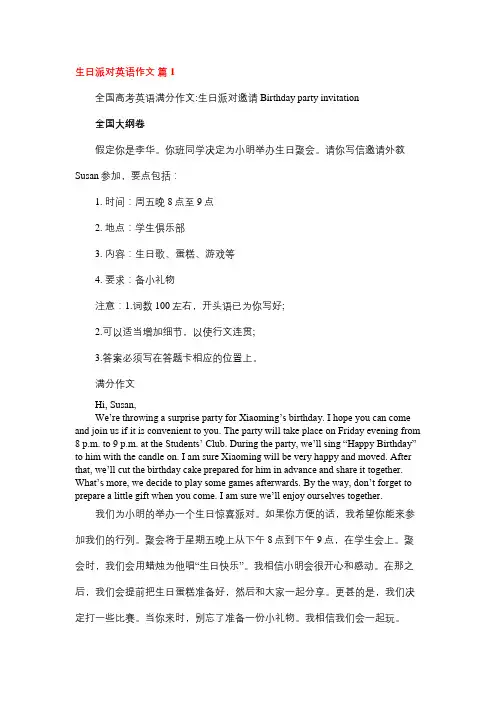
生日派对英语作文篇1全国高考英语满分作文:生日派对邀请 Birthday party invitation全国大纲卷假定你是李华。
你班同学决定为小明举办生日聚会。
请你写信邀请外教Susan参加,要点包括:1. 时间:周五晚8点至9点2. 地点:学生俱乐部3. 内容:生日歌、蛋糕、游戏等4. 要求:备小礼物注意:1.词数100左右,开头语已为你写好;2.可以适当增加细节,以使行文连贯;3.答案必须写在答题卡相应的位置上。
满分作文Hi, Susan,We’re throwing a surprise party for Xiaoming’s birthday. I hope you can come and join us if it is convenient to you. The party will take place on Friday evening from 8 p.m. to 9 p.m. at the Students’ Club. During the party, we’ll sing “Happy Birthday” to him with the candle on. I am sure Xiaoming will be very happy and moved. After that, we’ll cut the birthday cake prepared for him in advance and share it together. What’s more, we decide to play some games afterwards. By the way, don’t forget to prepare a little gift when you come. I am sure we’ll enjoy ourselves together.我们为小明的举办一个生日惊喜派对。
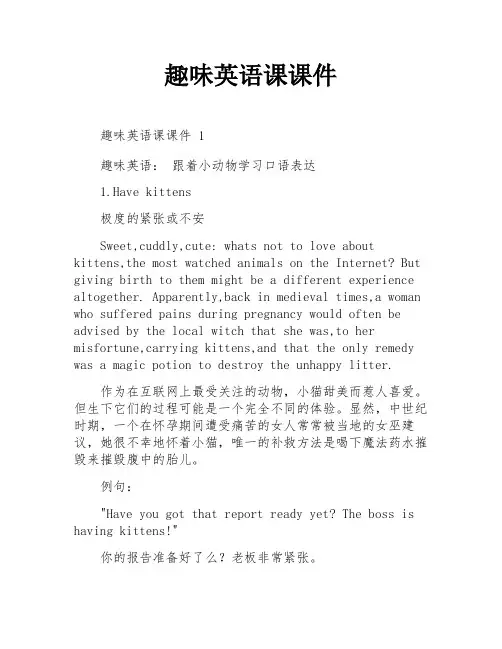
趣味英语课课件趣味英语课课件 1趣味英语:跟着小动物学习口语表达1.Have kittens极度的紧张或不安Sweet,cuddly,cute: whats not to love about kittens,the most watched animals on the Internet? But giving birth to them might be a different experience altogether. Apparently,back in medieval times,a woman who suffered pains during pregnancy would often be advised by the local witch that she was,to her misfortune,carrying kittens,and that the only remedy was a magic potion to destroy the unhappy litter.作为在互联网上最受关注的动物,小猫甜美而惹人喜爱。
但生下它们的过程可能是一个完全不同的体验。
显然,中世纪时期,一个在怀孕期间遭受痛苦的女人常常被当地的女巫建议,她很不幸地怀着小猫,唯一的补救方法是喝下魔法药水摧毁来摧毁腹中的胎儿。
例句:"Have you got that report ready yet? The boss is having kittens!"你的报告准备好了么?老板非常紧张。
"Were so late – my mumll be having kittens."我们迟到了,我妈妈一定心烦意乱。
2.All dressed up like a dogs dinner穿着特别或招摇的衣服The Brits love their dogs –they’re the most popular pet in the UK. Dogs dinners,however,are not usually very appealing at all – in fact,the expression a dogs dinner on its own also means a mess.英国人爱狗,狗是英国最受欢迎的动物。

大学英语21)美国人一般早早就安排好他们的退休生活。
Americans usually make plans for their retirement well in advance.2)他们通常被看做最有希望的歌手。
They are commonly regarded as the most promising singers.3)我从你的推荐人那里听说雇主曾给他们打过电话。
I ’ve heard from your references that the employer had called them.4)请告诉我们具体时间,以便我们做好适当的准备。
Would you please inform us the exact date so that we can make proper arrangements.5)我们对出席派对人数的估计与实际来的人数相差了一大截。
Our estimate of how many people would show up at the party missed by a mile.6)只要不成为阅读负担,你的报告可以包括足够多的细节。
Your report can include enough details without being a burden to read.Page21:6 .Pay attention to the italicized parts in the English sentences and translate theChinese sentences by simulating the structure of the English sentences.1.▲Although invitations are usually sent through the mail,informal invitations such as e-mail and phone invitations are becoming more acceptable.( 虽然邀请函通常通过信函方式发出,但目前像电子邮件、电话邀请等非正式邀请越来越被普遍使用。
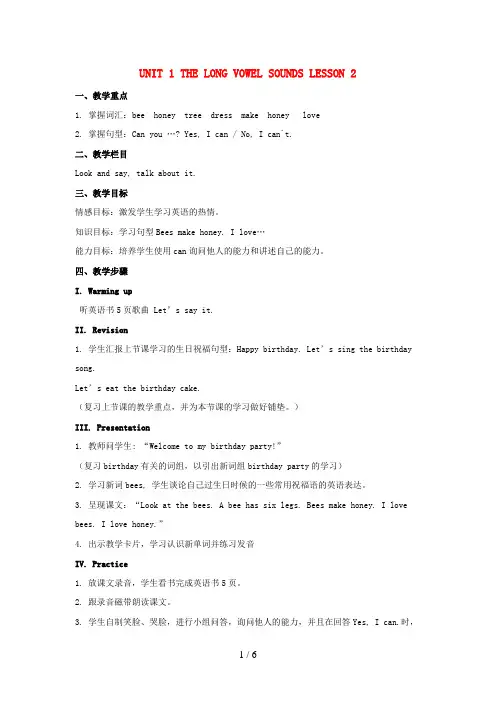
UNIT 1 THE LONG VOWEL SOUNDS LESSON 2一、教学重点1. 掌握词汇:bee honey tree dress make honey love2. 掌握句型:Can you …? Yes, I can / No, I can`t.二、教学栏目Look and say, talk about it.三、教学目标情感目标:激发学生学习英语的热情。
知识目标:学习句型B ees make honey. I love…能力目标:培养学生使用can询问他人的能力和讲述自己的能力。
四、教学步骤I. Warming up听英语书5页歌曲Let’s say it.II. Revision1. 学生汇报上节课学习的生日祝福句型:Happy birthday. Let’s sing the birthday song.Let’s eat the birthday cake.(复习上节课的教学重点,并为本节课的学习做好铺垫。
)III. Presentation1. 教师问学生: “Welcome to my birthday party!”(复习birthday有关的词组,以引出新词组birthday party的学习)2. 学习新词bees, 学生谈论自己过生日时候的一些常用祝福语的英语表达。
3. 呈现课文:“Look at the bees. A bee has six legs. Bees make honey. I love bees. I love honey.”4. 出示教学卡片,学习认识新单词并练习发音IV. Practice1. 放课文录音,学生看书完成英语书5页。
2. 跟录音磁带朗读课文。
3. 学生自制笑脸、哭脸,进行小组问答,询问他人的能力,并且在回答Yes, I can.时,要举起笑脸;回答No, I can`t时,要举起哭脸。
4. 小组会话:运用句型I love…5. 学唱歌曲蜜蜂歌,分组进行表演唱。

pep小学英语五年级上册4单元课件_小学5年级英语上册课本英语(Englih)是印欧语系-日耳曼语族-西日耳曼语支下的语言,由26个字母组合而成,英文字母渊源于拉丁字母,拉丁字母渊源于希腊字母,而希腊字母则是由腓尼基字母演变而来的。
学习目标1.能听、说、读、写单词“ing”,“ong”,“kungfu”,“dance”和词组“ingEnglihong”,“playthepipa”,“dokungfu”,“drawcartoon”。
2.能在创设的实际情景中灵活运用句型“Whatcanyoudo”,“Ican…”。
3.能听懂、会唱歌曲“Whatcanyoudo”。
4.能完成“Doaurvey”部分的对话任务。
5.鼓励学生了解身边同学的能力,做生活中的有心人。
学习重难点1.能听、说、读、写单词“ing”,“ong”,“kungfu”,“dance”和词组“ingEnglihong”,“playthepipa”,“dokungfu”,“drawcartoon”。
2.能在创设的实际情景中灵活运用句型“Whatcanyoudo”,“Ican…”。
教学难点1.新词汇和词组的学习。
2.能在创设的实际情景中灵活运用句型“Whatcanyoudo”,“Ican…”。
教学过程二次备课一、课前热身(Warm-up)1.FreetalkS:Fine,thankyou.AndyouT:I’mfine,too.AreyoureadyforourclaS:Ye.2.热身活动T:Nowlet’doomewarming-uppractice.Allofyou,litentome,pleae.Standupandfollowme.Run,Icanr un(read,jump,wim,fly,clean,draw…).二、课前预习(Preview)学习歌曲“Whatcanyoudo”T:Youcanjump,run,wim…You’reogreat.Nowlet’learnaongcalled “Whatcanyoudo”.第一次播放歌曲录音,全班学生跟着录音唱歌曲。

成都2024年小学四年级英语第6单元期中试卷考试时间:90分钟(总分:120)B卷考试人:_________题号一二三四五总分得分一、综合题(共计100题)1、填空题:Her _____ (阿姨) is very kind.2、填空题:The _____ (发芽) stage is critical for a seed.3、What do you call the main character in a movie or play?A. DirectorB. ActorC. ProtagonistD. Supporting actor答案:C4、选择题:What color do you get when you mix red and white?A. PinkB. PurpleC. OrangeD. Green5、填空题:The assassination of Archduke Ferdinand sparked ________ (第一次世界大战).6、填空题:My dad is a skilled __________ (木匠) who builds furniture.7、听力题:A __________ is a geological feature formed by the action of waves.8、What do we call the act of traveling to another country?A. VacationB. TripC. JourneyD. Travel答案:D9、听力题:The ancient Greeks were known for their ________ sculptures.10、填空题:The _____ (环境) can influence how plants grow.11、What is the opposite of strong?A. WeakB. FragileC. DelicateD. All of the above答案:D12、听力题:My sister is a ______. She enjoys drawing cartoons.13、听力题:I have a _____ (question/answer) for you.14、What do we call the study of the Earth's physical features?A. GeographyB. GeologyC. CartographyD. Meteorology答案: A. Geography15、填空题:He is a _____ (有趣的) person to talk to.16、填空题:I have a toy _____ that can spin around.17、填空题:The _____ (花坛) is filled with colorful blooms.18、听力题:My mom enjoys gardening and planting ____ (vegetables).19、填空题:The tiger has orange and ______ stripes.20、填空题:The parrot has a colorful ______ (羽毛).I love to collect ______ (书籍) about different cultures and ______ (习俗).22、听力题:The ____ is known for its colorful feathers and can talk.23、What do we call a scientist who studies rocks?A. BiologistB. GeologistC. ChemistD. Physicist答案:B24、听力题:A _______ is a substance that can donate protons in a chemical reaction.25、填空题:My ________ (玩具名称) is a great conversation starter.26、听力题:The door is ______ (open) and welcoming.27、填空题:The ________ was a significant event in the history of international diplomacy.28、填空题:The parrot talks and _________. (模仿)29、听力题:We need to ______ (study) for the test.30、Which food is made from wheat and often eaten for breakfast?A. RiceB. BreadC. MeatD. Fruit答案:B31、填空题:The frog croaks loudly after it _______ (下雨).32、填空题:The country famous for its bicycles is ________ (荷兰).The _____ (balloon/kite) is flying.34、填空题:古罗马的_____ (Colosseum) 是一个重要的历史遗址。
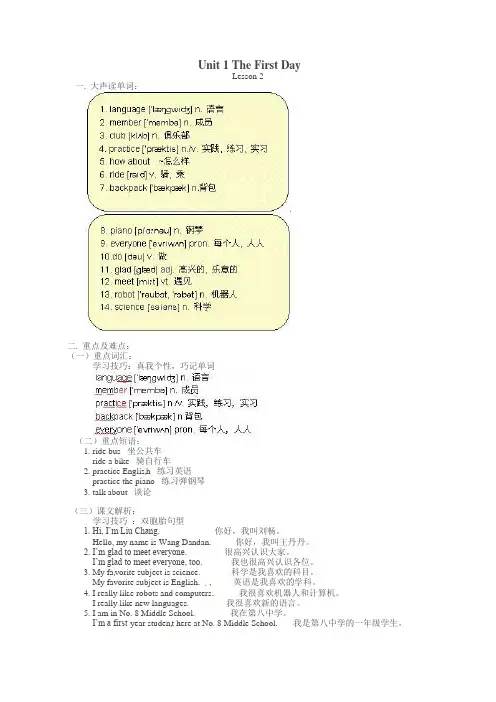
Unit 1 The First DayLesson 2一. 大声读单词:二. 重点及难点:(一)重点词汇:学习技巧:真我个性,巧记单词(二)重点短语:1. ride bus 坐公共车ride a bike 骑自行车2. practice Englis h 练习英语practice the piano 练习弹钢琴3. talk about 谈论(三)课文解析:学习技巧:双胞胎句型1. Hi, I’m Liu Chang.你好,我叫刘畅。
Hello, my name is Wang Dandan. 你好,我叫王丹丹。
2. I’m glad to meet everyone.很高兴认识大家。
I’m glad to meet everyone, too.我也很高兴认识各位。
3. My fa vorite subject is science. 科学是我喜欢的科目。
My favorite subject is English. 英语是我喜欢的学科。
4. I really lik e robots and computers. 我很喜欢机器人和计算机。
I really like new languages. 我很喜欢新的语言。
5. I am in No. 8 Middle School. 我在第八中学。
I’m a first-year studen t here at No. 8 Middle School. 我是第八中学的一年级学生。
难点句型:1. I practice English in the English club. 我在英语俱乐部练习英语。
2. I practice the piano every day. 我每天练习弹钢琴。
3. I am a member of the school science club. 我是学校科学俱乐部的成员。
I am a membe r of the school English club. 我是学校英语俱乐部的成员。
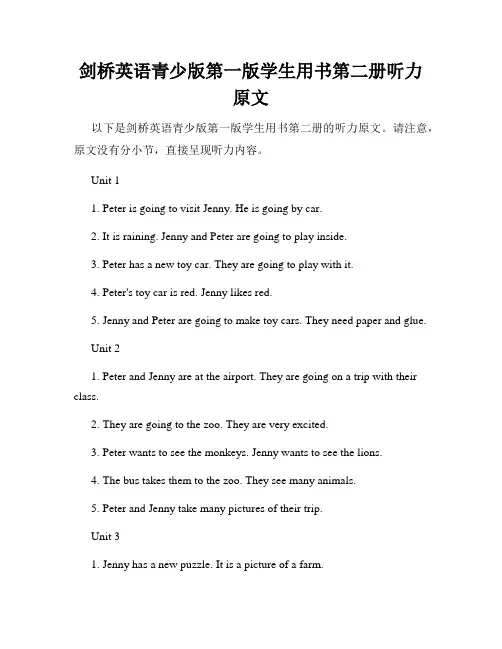
剑桥英语青少版第一版学生用书第二册听力原文以下是剑桥英语青少版第一版学生用书第二册的听力原文。
请注意,原文没有分小节,直接呈现听力内容。
Unit 11. Peter is going to visit Jenny. He is going by car.2. It is raining. Jenny and Peter are going to play inside.3. Peter has a new toy car. They are going to play with it.4. Peter's toy car is red. Jenny likes red.5. Jenny and Peter are going to make toy cars. They need paper and glue.Unit 21. Peter and Jenny are at the airport. They are going on a trip with their class.2. They are going to the zoo. They are very excited.3. Peter wants to see the monkeys. Jenny wants to see the lions.4. The bus takes them to the zoo. They see many animals.5. Peter and Jenny take many pictures of their trip.Unit 31. Jenny has a new puzzle. It is a picture of a farm.2. Jenny and Peter are putting the puzzle together. It is not easy.3. They find a piece that is missing. It is on the floor.4. The puzzle is finished. It is a beautiful picture of a farm.5. Jenny and Peter are going to show their puzzle to their friends.Unit 41. Peter is going to have a birthday party. He is going to be five years old.2. Jenny and Peter are making invitations for the party. They need markers and paper.3. They are going to play games and eat cake at the party.4. Peter's mom is making a cake. It is going to be big and yummy!5. Peter is very happy. He can't wait for his party.Unit 51. Peter and Jenny are playing outside. It is sunny today.2. Jenny finds a butterfly. It is a beautiful butterfly.3. They look for flowers. They want to give the butterfly some nectar.4. The butterfly flies away. Peter and Jenny wave goodbye.5. They go home with smiling faces. They had a great time.Unit 61. Peter and Jenny are at the beach. It is hot.2. They are building sandcastles. They use buckets and shovels.3. Peter likes to splash in the water. Jenny likes to collect seashells.4. They have a picnic on the beach. They eat sandwiches and fruit.5. It is time to go home. They are tired but happy.这是剑桥英语青少版第一版学生用书第二册的听力原文。
小学三年级上册英语第二单元期中试卷(含答案含解析)英语试题一、综合题(本题有50小题,每小题2分,共100分.每小题不选、错误,均不给分)1.She _______ her homework now.2.Which one is the season after spring?A. SummerB. AutumnC. WinterD. Fallst weekend, I _______ (have) a sleepover at my friend’s h ouse. We _______ (watch) a movie and then _______ (play) video games. After that, we _______ (make) some snacks and _______ (sit) in the living room talking. My friend _______ (bring) her pet dog, and we _______ (play) with it. We _______ (stay) up late, but we _______ (feel) very happy. In the morning, we _______ (wake) up early and _______ (eat) breakfast together. It _______ (be) so much fun.4.Which of these is not a color?A. RedB. BlueC. ChairD. Green5.We __________ (be) very busy last weekend. On Saturday, my parents __________ (clean) the house, and I __________ (help) by vacuuming the floor. After lunch, we__________ (go) to the supermarket to buy some groceries. On Sunday, we __________ (visit) my grandparents. We __________ (have) a big dinner at their house, and after that, we __________ (play) board games. It __________ (be) a wonderful weekend.6.Which of these is something we wear on our feet?A. ShoesB. HatC. ScarfD. Gloves7.Which one is used for drinking?A. CupB. KnifeC. PlateD. Spoon8.I _______ (is / am / are) a student.9.What do we use to write on paper?A. SpoonB. PenC. PlateD. Knife10.What is the capital of England?A. LondonB. ParisC. RomeD. Berlin11.Sarah is going to a cooking class today. She is going to learn how to make__________. She needs to bring some ingredients like __________, __________, and__________. The teacher will show the students how to mix the ingredients and bake the __________ in the oven.12.What is the opposite of "fast"?A. SlowB. TallC. LargeD. Happy13.I _______ (read / reads / reading) a book right now.14.We ______ (visit) the zoo last weekend. It ______ (be) a sunny day, and we ______ (see) many animals. My favorite animal ______ (be) the elephant. We ______ (watch) it play with water for a long time. After the zoo, we ______ (go) to a nearby park to have a picnic.15.I _______ (play) the piano in the evening.16.What is the color of a watermelon?A. GreenB. RedC. YellowD. Orange17.I _______ want to play soccer.18.Which one is a pet?A. LionB. TigerC. DogD. Elephant19.This morning, I woke up at ______ o’clock and started my day. I ate some ______ and drank a glass of ______ for breakfast. After breakfast, I put on my ______ and packed my ______ into my bag. My school starts at ______, so I left home at ______ to make sure I was on time.20.They _______ (go / goes) to school by bus.21.We _______ (go) to the museum on Sundays.22.Where do fish live?A. In the skyB. On the groundC. In the waterD. In the trees23.What is the opposite of "empty"?A. FullB. SmallC. LightD. Heavy24.Which animal can fly?A. DogB. BirdC. FishD. Elephant25.We _______ (have / has / had) a math class every Monday.26.Which of these is used to clean the floor?A. BroomB. PlateC. PenD. Knife27.Which of these animals can fly?A. CatB. DogC. BirdD. Fish28.We ______ (have) a science test yesterday. I ______ (study) hard for it, but I still ______ (find) it difficult. My friend Sarah ______ (help) me with some of the questions.I ______ (feel) nervous before the test, but I ______ (do) my best.29.This afternoon, I am going to the library to borrow a book. I will choose a storybook because I enjoy reading about adventures. After I finish the book, I will return it to the library and choose another one.30.In English, we use adjectives to describe nouns. When comparing two things, we often use the comparative form of adjectives. Which of the following sentences uses the comparative form of the adjective correctly?A. This book is more interesting than that one.B. This book is most interesting than that one.C. This book is interesting than that one.D. This book is more interest than that one.31.She _______ (play) with her friends in the park.32.My mom ______ (be) a great cook. She ______ (make) delicious meals for our family every day. Yesterday, she ______ (cook) pasta for dinner, and it ______ (taste) amazing. We all ______ (enjoy) the meal very much. I ______ (help) her in the kitchen sometimes, and it ______ (be) fun.33.Which animal is known as the king of the jungle?A. LionB. TigerC. ElephantD. Giraffe34.Which of these is a type of flower?A. RoseB. PotatoC. CarrotD. Cucumber35.We _______ dinner at 7:00 PM.36.My parents _______ to the cinema last night to watch a new movie. They told me it was really exciting. (go, goes, went, gone)37.I always ______ (wake) up at 7:00 AM. After I ______ (get) up, I ______ (brush) my teeth and ______ (have) breakfast. Then, I ______ (leave) for school at 8:00. I______ (be) very happy because today is my birthday, and my friends ______ (bring) me gifts.38.Which of these is a fruit?A. CarrotB. PotatoC. AppleD. Cucumber39.Which of these is used to write?A. PencilB. PlateC. ForkD. Spoon40.I _______ (have) lunch at school.41.I ______ (study) English every day. My teacher ______ (be) very kind and helpful. She ______ (teach) us many new words and phrases. Last week, we ______ (learn) a song in English. I ______ (sing) it in front of the class. My friends ______ (say) I ______ (sing) very well. I ______ (feel) happy.42.I have a big family. There are six people in my family. My father is a teacher, and my mother is a doctor. I have two brothers and one sister. We all like to go on trips together. Last summer, we ______ (go) to the beach for vacation.43.Which one is used for eating?A. KnifeB. BookC. PenD. Watch44.They _______ (don’t / doesn’t / not) understand the question.45.Which of these is a color?A. TableB. RedC. SpoonD. Chair46.Which of these is a family member?A. MotherB. DogC. ChairD. Table47.David loves to read books. Every Saturday, he goes to the library to borrow a new __________. His favorite books are about __________ and animals. David always chooses books with __________ pictures because they make the story more interesting. After reading a book, David likes to __________ in the library.48.We _______ (like) to eat pizza on Fridays.49.I am learning how to ride a bicycle. At first, I was a little scared because I thought I might fall. But after practicing for a few days, I started to feel more confident. Now, I can ride up and down the street without anyone holding me. My mom says I need to wear a __ and __ to stay safe while riding.50.What do you call a baby cat?A. KittenB. CubC. PuppyD. Calf(答案及解释)。
新视野大学英语视听说教程第1册翻译UNIT 1III. Listening InTask 1:大家早上好。
我欢迎你来伦敦城市大学。
我是贝蒂·拉塞尔和我工作的国际学生的办公室。
我有一些对你很重要。
首先,您必须注册在8月28日。
拿起你的身份证在我们的办公室。
它们,你需要接一个库卡,这样您就可以从图书馆借书。
向他们展示你的ID卡在了图书馆,他们会为你做这些。
你可能会考虑在我们学校的体育设施。
没有收取学生使用,当然你得出示你的身份证。
关于医疗援助,大学都有自己的健康中心,和所有的服务都是免费注册学生。
Task 2:大家早上好。
我欢迎你来伦敦城市大学。
我是贝蒂·拉塞尔和M:嗨,丽莎。
在校园的生活怎样?W:嗨,约翰。
哦,没有那么差。
不错的事实上。
M:是,你怎么看?我的意思是,你喜欢住在学校里吗?W:是的,我喜欢住在这里,因为有如此多的人周围,很容易交朋友。
你呢?你曾经住在一个宿舍过吗? M:不,这是第一次。
W:我认为你会发现它很方便。
图书馆、实验室、体育中心和其他设施是正确的校园。
M:那是真的。
这里的气氛不同于外部。
但我想住在城里也有它的优势,就像被靠近购物中心。
你知道,我们的大学是如此远离市中心。
W:但是通勤到类…我的意思是,你会这么早就起床去课程时间。
然后回家会这么多时间。
M:是的,但是这里的食物…看起来都一样,在自助餐厅的每一天。
W:嗯,我认为这里的食物是可以的,如果你想改变,你可以偶尔出去吃。
M:没错。
Task 3:你好,你好吗?当大多数人把英语作为第二语言来学,他们学习的正式英语。
不幸的是,学习它像这往往让你感觉遥远和无聊。
事实是,大多数人在讲英语的国家就不再和对方说话在这样一个正式的方式。
他们说在一个轻松的方式给他们的朋友和家庭。
随意说话,人们倾向于使用大量的非正式或口语词,也缩短和连接他们的短语。
他们说诸如“嗨,有什么事吗?”或“嘿!Whatcha被迪翁”? “这些表达式都是常见的和自然,使你看起来像一个美国人。
小学五年级下册英语第2单元期测验题(答案和解释)英语试题一、综合题(本题有50小题,每小题2分,共100分.每小题不选、错误,均不给分)1.Which of these is a piece of clothing?A. ShirtB. SpoonC. PlateD. Chair2.Which one is a number?A. FourB. SpoonC. PlateD. Dog3.Which of these is a time of day?A. MorningB. ChairC. SpoonD. Book4.Which of these animals is known for its long neck?A. GiraffeB. ElephantC. LionD. Bear5.Which of these is a shape?A. CircleB. SpoonC. ChairD. Plate6.I have a pet cat. It is very ______ and likes to sleep a lot. In the morning, I give it some ______ to eat. It loves to play with a ______, and sometimes it chases it around the house. My cat is very ______ and always makes me smile.7.Which one is a number?A. BookB. TenC. CarD. Dog8.We ______ (have) a test yesterday. I ______ (study) for the test all week. When I______ (take) the test, I ______ (feel) confident.9.What do you wear on your head?A. HatB. ShoesC. GlovesD. Pants10.My father __________ a doctor.A. amB. isC. areD. be11.Which of these is used to measure temperature?A. ThermometerB. RulerC. ScaleD. Clock12.The cat is _______ the box.A. onB. inC. underD. at13.Which of these is a day of the week?A. SummerB. MondayC. JanuaryD. Book14.Whats the weather like today?A. Its a cat.B. Its a blue sky.C. Its raining.D. Its school.15.What do we use to write on paper?A. SpoonB. KnifeC. PencilD. Fork16.What is the opposite of "hot"?A. ColdB. WetC. SweetD. Tall17.In the morning, I usually ______ (do) my homework before school. After that, I______ (get) dressed and ______ (eat) breakfast. I ______ (leave) for school at 7:30 a.m. and ______ (arrive) at school at 8:00 a.m. On weekends, I ______ (have) more time to play and relax.18.Which of these is a mode of transportation?A. ChairB. BicycleC. SpoonD. Plate19.What is your favorite fruit?A. AppleB. ChairC. BookD. Pen20.Which of these is a type of fruit?A. PearB. CarrotC. LettuceD. Potato21.My family ______ (have) a pet dog named Max. He ______ (be) very friendly and playful. Every morning, he ______ (run) around the garden and ______ (chase) his favorite ball. Yesterday, Max ______ (learn) a new trick: he ______ (sit) on command. We ______ (be) so proud of him.22.Which one is used to eat food?A. KnifeB. SpoonC. ForkD. All of the above23.My grandmother ______ (live) in a small village. She ______ (have) a beautiful garden with many flowers. Every spring, the flowers ______ (bloom), and it ______ (look) very colorful. Last weekend, I ______ (visit) her and we ______ (plant) some new flowers together. It ______ (be) a wonderful time.24.Which one is used to measure temperature?A. ThermometerB. RulerC. ClockD. Scissors25._______ is your birthday?A. WhenB. WhereC. HowD. What26.Which of these animals can fly?A. PenguinB. DogC. BirdD. Elephant27.Which of these is the opposite of "tall"?A. ShortB. HeavyC. BigD. Light28.Which animal has wings?A. ElephantB. DogC. BirdD. Turtle29.She is __ than her sister.A. tallB. tallerC. tallestD. more tall30.Which animal is known for its long neck?A. ElephantB. GiraffeC. DogD. Tiger31.Which of these is a season?A. DecemberB. MondayC. WinterD. Chair32.How many days are there in a week?A. FiveB. SixC. SevenD. Eight33.Which of these is a toy?A. BallB. SpoonC. ForkD. Plate34.What is the capital of England?A. LondonB. ParisC. New YorkD. Sydney35.Which of these is a musical instrument?A. DrumB. PlateC. ChairD. Spoonst weekend, I _______ (have) a sleepover at my friend’s house. We _______ (watch) a movie and then _______ (play) video games. After that, we _______ (make) some snacks and _______ (sit) in the living room talking. My friend _______ (bring) her pet dog, and we _______ (play) with it. We _______ (stay) up late, but we _______ (feel) very happy. In the morning, we _______ (wake) up early and _______ (eat) breakfast together. It _______ (be) so much fun.37.What is the opposite of "short"?A. TallB. LongC. SmallD. Heavy38.What time do we usually have breakfast?A. In the afternoonB. In the morningC. At nightD. At noon39.I ______ (not/like) to eat spinach when I was younger, but now I ______ (eat) it every day because it ______ (be) very healthy. Yesterday, I ______ (eat) spinach with chicken for lunch.40.Which of these is a shape?A. TriangleB. ChairC. CarD. Book41.Which of these is used to clean?A. KnifeB. SpoonC. BrushD. Plate42.What is the opposite of "light"?A. HeavyB. FastC. SmallD. Tall43.Which of these animals is a pet?A. DogB. ElephantC. GiraffeD. Tiger44.Which one is a body part?A. MouthB. PlateC. SpoonD. Chair45.Which of these is a number?A. FourB. PlateC. SpoonD. Chair46.Which of these is a mode of transportation?A. CarB. TreeC. ChairD. Table47.What do we use to clean the whiteboard?A. MarkerB. EraserC. PenD. Chalk48.How do you say "你好" in English?A. ByeB. Thank youC. HelloD. Goodbye49.Which of these is a month?A. MondayB. MarchC. SummerD. December50.Which of these is used to eat salad?A. KnifeB. SpoonC. ForkD. Plate(答案及解释)。
五年级下册英语第46页到55页的课堂笔记由于不清楚您使用的是哪本教材(五年级下册英语有多种版本),以下以人教版(PEP)为例,为您提供部分从第46 - 55页可能涉及到的重点内容:### 一、单词1. **first (1st)**- **英语释义**:coming before all others in time or order; earliest- **用法**:作形容词时,表示“第一的;首要的”,可修饰名词;作副词时,表示“首先;最初”;作名词时,表示“第一个人(或事物)”。
- **双语例句**- This is my first time to visit Beijing.(这是我第一次参观北京。
)- First, we need to make a plan.(首先,我们需要制定一个计划。
)2. **second (2nd)**- **英语释义**:next after the first; coming after the first in time or order- **用法**:与first类似,可作形容词、副词和名词,分别表示“第二的;次要的”“其次;第二”“第二名;秒”等意思。
- **双语例句**- February is the second month of the year.(二月是一年中的第二个月。
)- He came second in the race.(他在比赛中获得第二名。
)3. **special**- **英语释义**:not ordinary or usual; different from what is normal- **用法**:形容词,用来修饰名词。
- **双语例句**- This is a special day for me.(这对我来说是一个特殊的日子。
)- There is a special offer in the store today.(今天商店有特价优惠。
第17课鹅太太的派对Mrs.Goose's Party 鹅太太的派对"I think I will have a party," said Mrs.Goose to herself. "Yes, I will have a party this afternoon at three o'clock." “我想有个派对,”鹅太太自言自语道,“对,我要在今天下午三点开个派对。
”"I will ask Mrs.Squirrel1, Mrs.Rabbit, and the three Ducks." “我要叫上松鼠太太、兔太太和三只鸭子。
”So Mrs. Goose began to get ready for the party. She quickly sweptand dusted2 her house. 于是,鹅太太开始准备派对。
她迅速清扫了房间。
Then she began to think about what she would have to eat. 然后开始思考吃什么。
"I believe I will have sweet cookies and some cocoa3," thoughtMrs.Goose. “我会甜曲奇和一些可可,”鹅太太想,"It is a hot day, and I will make some ice cream, too." “天很热,我也要制作一些冰淇淋。
”She flew into her tiny kitchen, and soon she was as busy as a bee, making the cookies and cocoa. 她飞到小厨房里,不久就像蜜蜂一样忙碌着制作曲奇和可可。
Then she made the ice cream. 然后做了冰淇淋。
美国小学英语教材 2第 2 课 莫莉的第一次派对Molly's First Party 莫莉的第一次派对 Molly had1 four nice pets to play with. 莫莉有四个非常要好的宠物玩伴。
Their name were Jumbo, Big Boy, Penny2, and Quack3. 他们的名字分别是:江宝、“大男孩”、潘尼和呱呱。
Jumbo was4 a fat little pig who liked to dig5 holes with his nose. 江宝是一头爱用鼻子挖洞的小肥猪。
Big Boy was a big white rooster who was very proud6. “大男孩”是一只十分骄傲的白色大公鸡。
Penny was a little dog who could7 do tricks8. 潘尼是一只会耍把戏的小狗。
And you can guess that Quack was a little yellow duck. 你可能猜到了,呱呱是一只小黄鸭。
Molly had just come to town from the farm. 莫莉刚从农场搬到城镇, She did9 not know any children in town, but she had a good time playingwith her pets. 镇上的孩子她一个都不认识。
但她和她的宠物们玩得很开心。
After school started, Molly made10 many new friends. 开学以后,莫莉交了很多新朋友。
All the children liked her and were very nice to her. 所有的孩子都喜欢莫莉,对她非常友善。
One day Betty Jane asked Molly to come to a party at her house on the nextSaturday. 一天,贝蒂.简邀请莫莉下周六去她家里参加一个派对。
Molly had never gone to a party before. 莫莉以前从未参加过派对。
She was so happy that she ran11 all the way home to tell her mother aboutit. 她高兴地一路跑回家,将这件事告诉了妈妈。
Molly's mother was happy, too, when Molly told her about the party. 当莫莉将派对的事告诉妈妈时,莫莉的妈妈也很开心。
"I know that you will have a nice time," she said12. “我知道你肯定会玩得非常开心,”她说,1美国小学英语教材 2"And you shall13 have a new dress for your first party." “你也该为你的第一 次派对买一条新裙子。
”Molly thought14 she could not wait for Saturday to come. 莫莉已经等不及了, 一心想着星期六快点儿到来。
But Saturday afternoon came15 at last, and Molly was ready for the party. 终于到了星期六的下午,莫莉做好了去参加派对的准备。
When she went out into the yard16, all the pets were there waiting for her. They wanted to go with her. 当她来到屋外院子的时候,宠物们正在那里等着她,他们 想和她一块儿去。
"Oh, dear!" said Molly. "I wonder17 if the pets will try to follow me. “噢,天 哪!”莫莉说,“不知道他们会不会跟着我。
If they do, they may get lost." 要是那样,他们可能会走丢的。
” "Shut18 them up in the garage19," said her mother. "Then they cannot follow you." “把它们关在车库里吧,”莫莉的妈妈说道,“这样他们就不会跟着你了。
” Molly put all her pets in the garage. 莫莉把所有的宠物都赶进了车库。
"Good-by, my dears," she said. "I am sorry to shut you in here. “再见,亲爱 的,”她说,“我很抱歉把你们关在这里, But I'll soon be back to play with you." 但是我很快就会回来和你们一起玩的。
” Molly went down the street with her head very high. 莫莉走在街上,头扬得 可高了。
She was proud because she was going20 to a party and because she had a new dress. 她非常自豪,不仅因为她将要去参加派对,还因为她穿着新裙子。
When she came near Betty Jane's house, Molly saw21 the children playing in the yard. 快到贝蒂.简家的时候,莫莉看见许多孩子正在院子里玩耍。
She began to hurry, for she was afraid that she was late. 她赶紧加快脚步, 生怕会迟到。
All at once Molly heard the children laugh. 突然,莫莉听到孩子们在笑。
Then she saw that all of them had stopped playing and were looking at her. 接着,她看见他们都停止了玩耍,望着她。
Molly stopped. 莫莉停下了脚步。
2美国小学英语教材 2"Oh, my!" she thought. "Why are they looking at me? “噢,天哪!”她想,“他 们为什么都看着我?I wonder if my new dress looks strange22. Oh, dear! I wish I had never come!" 难道是我的新裙子看起来太奇怪了?噢,老天啊!真希望自己压根儿就没来!”Then Molly heard a little noise behind her. 这时候,莫莉听到身后有一点儿嘈 杂声。
She turned around to see what it was, and she saw why all the boys and girls were laughing. 她转身一看,这下明白大家为什么笑了。
Penny, Jumbo, Big Boy, and Quack were all following23 Molly. 潘尼、江宝、 “大男孩”和呱呱都在莫莉的身后跟着呢。
Penny, the dog, came first. 走在最前面的是小狗潘尼, Next came Jumbo, the pig. Big Boy, the rooster, walked behind Jumbo. 接 着是小猪江宝,公鸡“大男孩”走在江宝后面, Last of all came Quack, the little duck. 最后是小鸭呱呱。
Molly could guess what had happened. 莫莉猜到是怎么回事了。
Jumbo, like all pigs, was always digging24 holes. 江宝和其他小猪一样总是不 停地挖洞。
He had made a hole in the ground25 under the garage, and all the other pets had followed him out. 他在车库的地上打通了一个洞,然后所有的宠物就跟着他一 块出来了。
Penny had gone sniff26, sniff along27 the ground after Molly. Then the others28 had followed Penny. 潘尼沿途边走边嗅,尾随在莫莉后面。
其他几个都 跟在潘尼后面。
Poor Molly was angry at her pets. 尴尬的莫莉对她的宠物很是生气。
"Go home!" she said to them. "Go right back home, every one of you!" “回 去!”莫莉说道,“你们都给我马上回家!” But the pets would29 not go home. They stood30 very still and looked very sad. 但这些宠物都不愿意回家,他们一动不动地站着,看起来非常难过。
Just then Betty Jane came running31 up. 就在这个时候,贝蒂.简跑了过来。
"Don't make them go home," she said. “别让他们回家了,”她说,3美国小学英语教材 2"Let them come to the party, too. It will be fun to play with them." “也让他 们一起来参加派对吧!和他们玩一定非常有趣。
”"Please do," said the other children. “让他们留下来吧!”其他的孩子说道。
So Jumbo, Big Boy, Penny, and Quack went to the party, too. 于是,江宝、 “大男孩”、潘尼和呱呱也一起参加了派对。